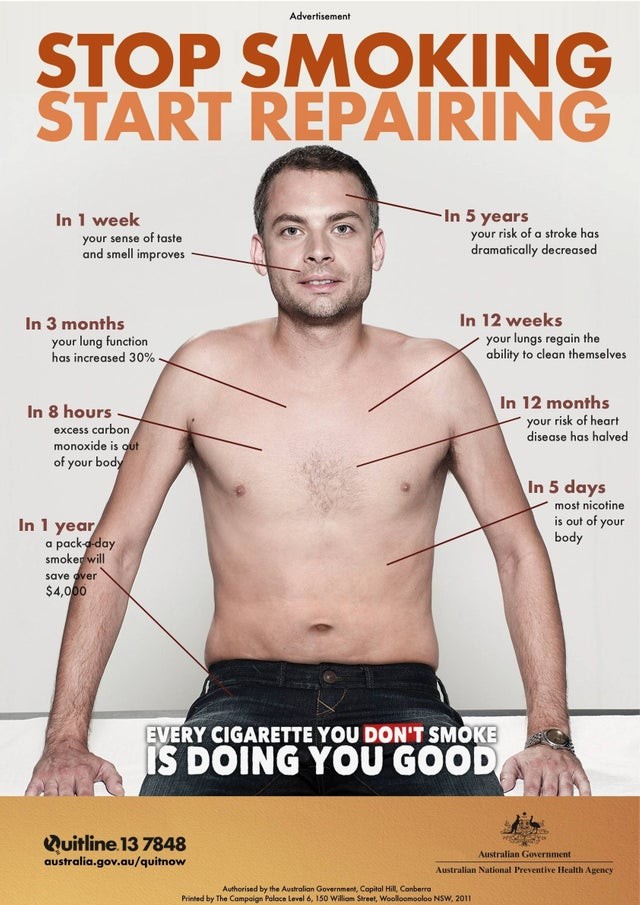
It's said that breaking a bad habit takes much longer than making one. The old estimate was 21 days, and more recent studies indicate it may take months
But what if there was a way to break your bad habit once and for all with only a few sessions with a specialist?
This is what happens when you enlist the help of a hypnotherapist to break a habit, such as smoking.
In this article, we’ll explore why you should consider a hypnotherapist for smoking cessation, explain what you can expect from hypnotherapy, and offer tips to help you get the most out of your sessions.
The Dangers Of Smoking
It's hard to find anyone who isn't aware of the dangers of smoking at this point.
The CDC reports that cigarettes damage virtually every organ in the body. Unfortunately, every day more and more people are finding themselves becoming victim to the negative side effects of smoking such as heart disease, emphysema, reduced fertility, type 2 diabetes, strokes, and even wrinkled skin.
Perhaps significantly, smoking is said to cause approximately 7 out of 10 cases of lung cancer. In addition, cigarettes increase your risk of developing cancers of the mouth and throat, bowel, bladder, voice box, kidney, stomach, liver and pancreas.
These conditions shorten life expectancy significantly - by approximately ten years on average. Close to 50% of all smokers die younger because of diseases linked to smoking, and only half of all smokers are expected to live past 70.
As a result, for many different ailments, even those unrelated to lungs, doctors often advise patients to stop smoking. Whether it's a doctor's advice or you're ready on your own to break the habit, only good can come of it.
Hard to quit
Doctors often recommend nicotine replacement therapy (such as nicotine gum and nicotine patches), a short course of smoking cessation medication, and support groups that promote positive thinking.
However, if you or someone you love is currently trying or has ever tried to quit smoking, you know how tough it can be. Even when you know that cigarettes are reducing your life expectancy, the cravings can be almost unbearable.
Non-smokers often fail to empathize with smokers when it comes to quitting, as they don't realize the physical and emotional effects that can occur while trying to break the habit. They don’t realize that people who are trying to quit struggle with headaches, nausea, anxiety and mood swings.
Hypnotherapy isn't necessarily new to the game of changing habits, but it's definitely something that has picked up steam in recent years as more and more people become more health conscious and head towards hypnotherapists to help them stop smoking.
If you aren't a believer in hypnotherapy quite yet, what do you have to lose by learning more? Let’s take a closer look at what hypnotherapy involves.

Just A Passing Trend?
Interestingly, hypnotherapy has been around in different forms since as early as the 1700s, but the curative type which would be used today for smoking cessation is from the mid-1900s.
The popularity of hypnosis can be partly traced back to Freud, who used it in conjunction with psychoanalysis. While he wasn’t particularly successful with hypnosis, his ideas inspired later scientists to create a more structured, effective approach.
Even with such a long history, there are still so many skeptics about the success of hypnotherapy. People sometimes say that it is pseudoscientific, or even that it is dangerous.
Perhaps you've had a friend or family member who has tried to get over fear or phobia or recall a hidden memory with the help of a hypnotherapist and had no luck.
Here's the thing: acupuncture, herbal remedies, and even traditional talk therapy don't always work for every single case. This is also true for hypnotherapy. However, this doesn’t mean that it is ineffective - in fact, the latest studies on hypnotherapy show that most people report at least marginal improvements.
If family or friends say that hypnotherapy didn’t work for him, that could just mean that this particular remedy was not right for them or that they weren’t in the right frame of mind at the time.
It doesn't necessarily mean that you won't have a successful session and get to the bottom of your smoking addiction.
Since hypnotherapy has had its ups and downs over the years with skeptics and success stories, the only way to know if it's right for you is to give it a try.
The key thing is that you shouldn't go into a session believing it won't help. As we’ll discuss in the next section, research on hypnotherapy indicates that your success rate has a lot to do with your frame of mind. So, you have to hold on to some hope that it will work for it to actually have a fighting chance.
The Right Frame Of Mind
You've got to believe in something for it to work, and this is especially true for hypnotherapy.
If you don't feel in your heart of hearts that it's effective and you worry that it won't ever do the job, it's a fruitless endeavor to even try.
That's because hypnotherapy is all mental! If you don't believe in it, you will subconsciously block anyone - even a trained hypnotherapist - from entering into that part of your brain where the bad habit needs to be erased.
Without access to this part of your mind during a session, the hypnotherapist will be unable to break the smoking habit, leaving you saying “I told you so” unfairly.
Remember, the habit of smoking is technically an addiction. Your body is addicted as is your mind. At this point, you may have tried the nicotine gum, patches or even quitting cold turkey.
The problem is that none of those remedies help with the mental and emotional aspects to quit smoking or address the reasons why you might depend on smoking to help manage stress.
This is why curing the addiction of the brain makes more sense than just focusing on the physical dependence on nicotine. If your brain does not feel the need for a cigarette, and you're eating healthy and taking care of your body otherwise, the mental part is taken care of as well as the physical part.

The Evidence
The efficacy of hypnotherapy has been tested in a range of studies that look at its impact on smokers. The results are encouraging! For example, according to research from The American Lung Association, 22% of smokers abstained from cigarettes for at least a month after their session.
Similarly, a study in the Journal of Nursing Scholarship reports that smokers undergoing hypnotherapy were around twice as likely to stop smoking for good (compared to those not trying hypnotherapy).
Meanwhile, there’s lots of positive anecdotal evidence from celebrities. For example, actor Ben Afleck wanted to stop smoking when he became a father in 2005. Reportedly, he used hypnotherapy to help achieve this goal. Ben Afleck is one of many celebrities who have used hypnosis to overcome something.
Give these promising results, hypnotherapy is at least worth a try - especially if conventional methods have failed to help you.
Common Worries About Hypnotherapy
Lots of smokers feel anxious about starting hypnotherapy, whether by using recordings or seeing a hypnotherapist in person.
You might feel unnerved by the idea of being put into a trance, or you might worry about being made to do something that you don’t want to.
Who can relax when wondering if the other person in the room is going to make them run around the room like a chicken?
While you can ask a hypnotherapist about all of these things, you might not even get to that point if you’re too nervous to book a session or download a recording. So, it’s important to learn about the reality of hypnotherapy for smoking cessation - it is quite different from the way hypnosis is portrayed in the media and on stage.
As we already noted, you need to be in the right frame of mind to be put into a hypnotic trance in the first place. But even when you’re in a trance, you can’t be told to believe or do things you don’t want to do.
If a hypnotherapist says something that you wouldn’t normally agree with, you will notice this and emerge from hypnosis. The only messages you will take on board are the ones that already gel with your values and goals.
Perhaps you’re also worried about becoming “stuck” in a trance. Rest assured, this isn’t possible - you are in control the entire time, in the same way, that you can stop a daydream or turn your attention away from a book.
You will be aware of what’s happening in the room, and will be able to respond if anything important happens around you.
The central message here is that hypnotherapy is far less scary and invasive than you might have thought. It’s a relaxing, empowering process that simply helps motivate you to do things you already want to do.
What To Expect In A Session With A Hypnotherapist
Once you feel that you're ready to take on hypnotherapy to stop smoking, it's time to make your initial appointment.
Read reviews or ask around for a recommendation for a qualified hypnotherapist in your area. You may have to attend a few sessions to get the full benefits, so do choose one somewhat close to where you live. It’s also important to be comfortable with your hypnotherapist, so you may want to have initial consultations with several practitioners in order to see who gels with you.
At the first appointment, the hypnotherapist will explain everything they are going to do and ask you some questions to ensure that you’re a suitable candidate for the process. They will also answer any questions you have.
It's recommended to write down any questions or worries you have leading up to your initial appointment so that you're fully prepared for this part. No question is too silly, and in fact, even the silliest questions are very important to get out on the table.
If you ask all your niggling questions, you won't have any mental holdups when the hypnotherapy begins, and you will feel fully at ease. Hypnotherapists are well used to debunking the stereotypes mentioned above, and this may provide extra reassurance.
Once you feel satisfied and are ready to begin, the therapist will begin putting you in the trance-like state (also known as a highly focused attention state of mind) that is needed to work on the mental side of breaking the habit.
This is when you need not worry about anything else you think you're supposed to be doing. Leave everything up to the hypnotherapist. In fact, you may not even remember what happens next; people often say that they wondered when the session will start when in fact it was already well underway.
Being in a hypnotic trance just feels like being deeply relaxed. Your muscles will feel loose and comfortable, your breathing will slow, and your mind will be calm. Studies on brain activity show that it reduces during hypnosis, though you will stay conscious throughout.

How Hypnosis Helps You Quit
While you're in the trance state, the hypnotherapist will be safely changing your responses to everyday smoking triggers that you will have previously discussed.
They will give you positive suggestions that change old, unhelpful beliefs about smoking. For example, if you think you “need” it for coping with stress, you’ll be offered a different perspective.
Since you will be in a highly suggestible state, they will also be able to successfully steer you away from choosing cigarettes in likely scenarios where you would previously have reached for one.
One popular approach is called Spiegel’s method, which helps smokers quit by communicating three central messages: that smoking is poisonous to your body, that your survival depends on a healthy body, and that if you want to survive you should protect your body.
In addition, hypnotherapists can actually change your feelings towards smoking. You can start to view cigarettes as negative, making you not only refuse a cigarette in the future but also making you feel complete hatred toward the habit altogether.
Some people begin to find smoking disgusting after a few sessions of hypnotherapy. In other words, hypnosis can turn a compulsive habit into something you find completely unappealing.
Listening to Hypnosis download Sessions
While the traditional way of receiving hypnotherapy involves seeing a therapist in person, there’s another option worth considering. Self hypnosis downloads - including ones that aim to help you stop smoking.
There are obvious benefits to choosing the online option. For one thing, it allows you to tailor your hypnotherapy sessions to your daily schedule and preferences. For example, you may want to listen to a session before bed and then just drift off to sleep.
Secondly, downloadable hypnotherapy sessions allow you to undergo hypnotherapy in the privacy of your own home, where you’ll be more comfortable. For example, if you find it hard to get into a calm, receptive state in front of a stranger, listening to hypnosis downloads can help you relax at a much easier way.
As we discussed above, being more comfortable and relaxed maximizes the chances that hypnotherapy will help. For many people, that kind of receptivity is best achieved at home.
Furthermore, with recorded sessions, there’s no limit to how often you can listen to them. Instead of waiting for a weekly appointment with a hypnotherapist, you can plan daily listening sessions if you like. This may speed up the process and help you kick your smoking habit more quickly.

What to Expect After a Hypnotherapy Session
Whether you attend a smoking cessation session in person or listen to a recording, once it ends you will be able to return to normal activity. It’s best to assume you will need at least five minutes to reorient yourself in the world, but that’s mainly about comfort.
People sometimes feel sleepy after being hypnotized. If this is true of you, it’s wise to schedule your sessions when you don’t have anything very demanding to do afterwards.
You may also have more intense dreams the night after you have a hypnotherapy session, and these dreams may provide useful insights into how you feel about smoking.
It’s possible to uncover new blocks and develop greater self-knowledge through vivid dreams.
Falling Off the Wagon
Now that you know the basics of how hypnotherapy works, let’s consider the expectations you should have.
While some people note massive shifts in their thinking after one session, it’s common to need more. After all, since it's near impossible to mention every time you would normally reach for a cigarette, it's near impossible to completely quit smoking after only one hypnotherapy session.
This doesn't necessarily mean that hypnotherapy is not a viable option to break this bad habit; it just means there is more work to be done, and the amount depends on how addicted you are.
At this stage some people pair hypnotherapy with a nicotine patch or with smoking cessation medication, depending on a doctor's advice for their particular case. Attending support groups with other people who are trying to quit can also be helpful at this time.
While you’re working on quitting smoking, the key thing is to be aware of when you feel the urge to smoke. Take notes, reflect on them, and share these notes with your doctor and hypnotherapist so that you can work out a strategy to best take care of the habit once and for all.
Experiencing A Positive Shift
If your first hypnosis session only helps you to stay away from cigarettes for a few days, this small shift already helps your body.
20 minutes after your last cigarette, your blood pressure normalizes, and after half a day your carbon monoxide levels normalize as well. Within a day, your body gets rid of mucus that has built up in your lungs as a result of smoking.
By the time you reach three days after your last cigarette, you’ll notice improvements in your breathing and should also have more energy.
Now it's up to you to take the first step towards this alternative cure for your smoking habit.
How well it works for you remains to be seen, but if you go in with an open mind, anything can happen. You have little to lose, and everything to gain.

Image source: http://australia.gov.au/quitnow







